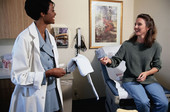
MONDAY, March 21 (HealthDay News) — Women should have an annual ob-gyn exam whether they need a Pap test or not, says the American College of Obstetricians and Gynecologists (ACOG).
ACOG released its updated recommendations for women’s annual routine ob-gyn screenings, tests and immunizations on March 21.
Recommended health assessments are grouped by age range, starting with girls aged 13, and takes into consideration that some women may have the need for additional screenings or counseling due to individual risk factors.
Across all age groups, standard components of the annual ob-gyn exam include assessing current health status, nutrition, physical activity, sexual behaviors, substance use (tobacco, drugs and alcohol), height, weight, body mass index and blood pressure.
Women aged 19 and up should have an annual breast and abdominal exam, and starting at age 21, a routine annual pelvic exam should be performed, according to an ACOG news release.
“Since the age a woman receives her first Pap test changed two years ago to age 21, and most women can have them less frequently than previously recommended, there’s this misconception that if you don’t need a Pap then you can skip the ob-gyn visit altogether,” Dr. Hal C. Lawrence, III, vice president for practice activities at ACOG, said in the news release.
“Nearly every woman age 21 and older needs an annual well-woman visit with her ob-gyn, regardless of whether cervical cancer screening is done. The Pap test is just one part of staying healthy,” he noted.
The updated schedule also outlines recommended vaccinations by age and risk group, states that all sexually active adolescents and women up to age 25 should undergo annual testing for chlamydia and gonorrhea, and recommends routine HIV testing for all sexually active adolescents and women aged 19 to 64.
The updated recommendations are published in the April issue of Obstetrics & Gynecology.
“The purpose of the annual ob-gyn visit is to detect and treat any new or ongoing health problems as well as to help prevent future ones from developing,” Lawrence said.
More information
The U.S. Centers for Disease Control and Prevention has more about women’s health.

